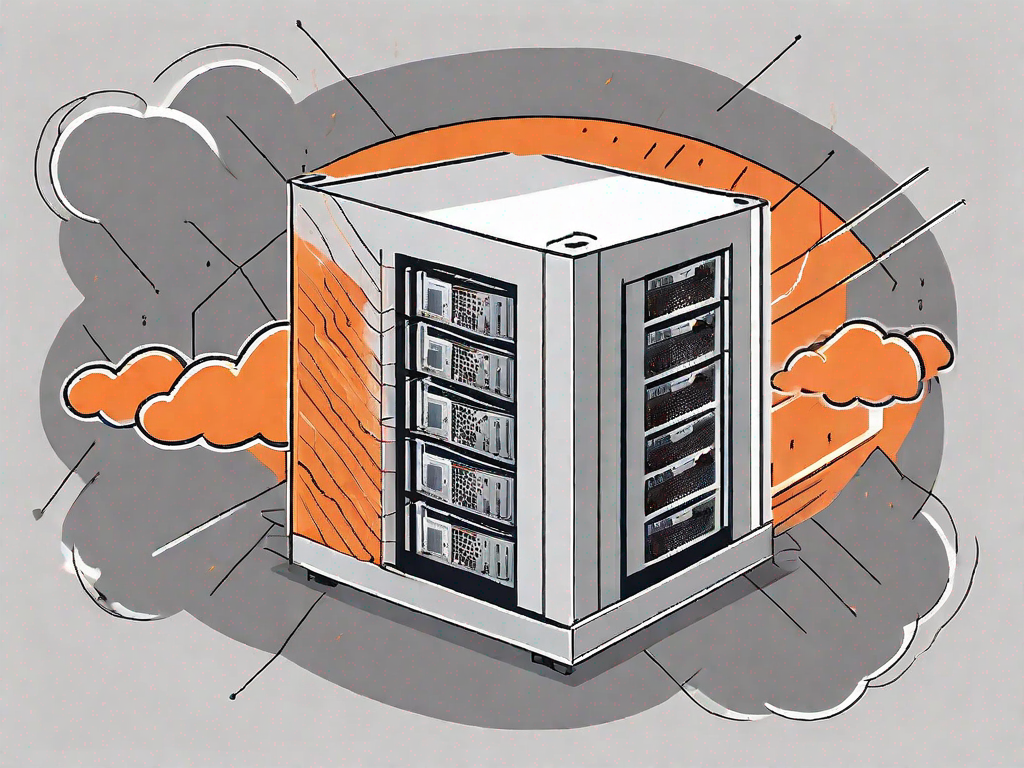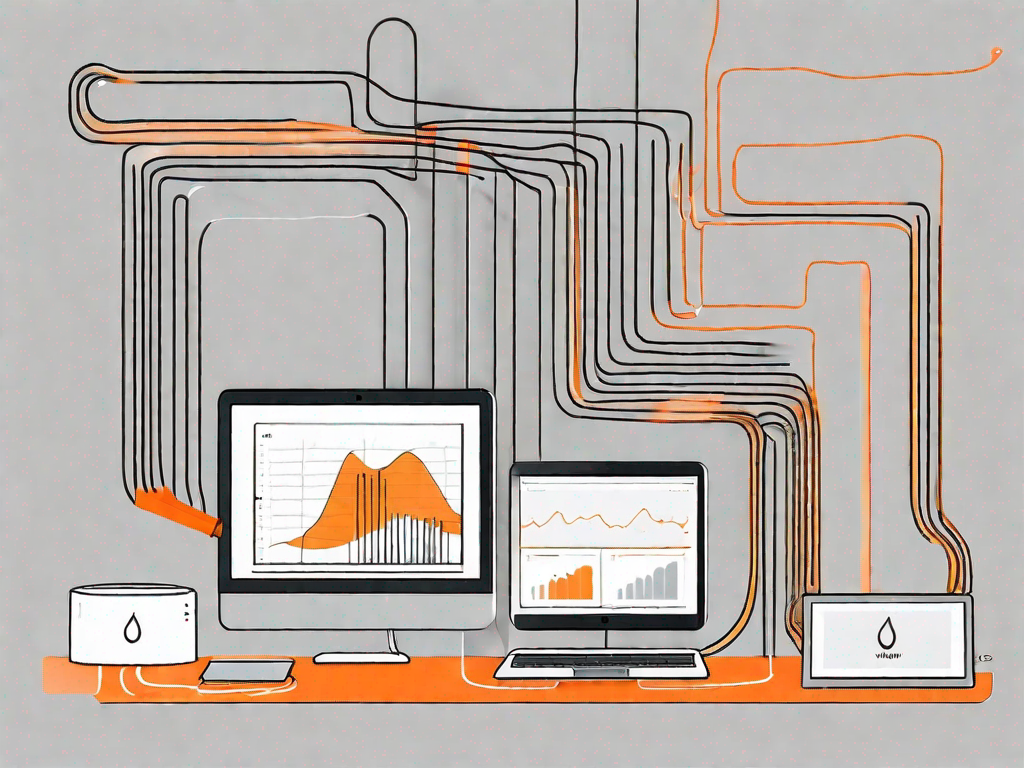.svg)
The Impact of DDoS Attacks and How Web Hosting Can Help
.svg)

Distributed Denial of Service (DDoS) attacks have become a growing concern for businesses of all sizes. In recent years, these malicious attacks have caused significant disruption and financial loss to countless organizations worldwide. As such, understanding DDoS attacks and the role of web hosting in mitigating their impact has become crucial for businesses operating in the increasingly digital landscape.
Understanding DDoS Attacks
DDoS attacks, short for Distributed Denial of Service attacks, are a malicious technique used by cybercriminals to disrupt the normal functioning of websites, networks, or web applications. These attacks aim to overwhelm the targeted system with an influx of traffic, rendering it inaccessible to genuine users. By exploiting vulnerabilities in the infrastructure, hackers can cause significant disruptions and potentially cause financial losses for businesses.
Now, let's delve deeper into the basics of DDoS attacks to gain a better understanding of how they work.
The Basics of DDoS Attacks
At their core, DDoS attacks involve the coordination of multiple compromised computers, often forming a "botnet." A botnet is a network of infected devices that are controlled by a central attacker, known as the "bot herder." These compromised devices, which can include computers, smartphones, or even Internet of Things (IoT) devices, are used to launch the attack.
Once a botnet is established, the bot herder directs the compromised devices to flood the targeted website or network with a massive amount of traffic. This flood of traffic overwhelms the servers, consuming valuable resources and causing the system to slow down or crash altogether. As a result, legitimate users are unable to access the targeted service, leading to frustration and potential financial losses for businesses.
Now that we have a better understanding of how DDoS attacks work, let's explore the motives behind these malicious acts.
The Motives Behind DDoS Attacks
DDoS attacks can be driven by various motives, ranging from personal vendettas to financial gain. Understanding the motives behind these attacks can help businesses and individuals better protect themselves against such threats.
One common motive behind DDoS attacks is personal revenge or mala fide intent. In some cases, individuals may launch these attacks out of spite or to settle personal scores. These attacks can be particularly damaging as they are often fueled by emotions and can be difficult to predict or prevent.
Another motive behind DDoS attacks is financial gain. Competitors in the digital marketplace may resort to launching DDoS attacks against their rivals to gain an unfair advantage. By disrupting the targeted business's online presence, competitors hope to divert potential customers to their own services or products. Additionally, criminal organizations may use DDoS attacks as a means of extortion. They threaten targeted businesses with repeated attacks unless a ransom is paid, putting immense pressure on the victims to comply.
It is important for businesses and individuals to stay vigilant and implement robust security measures to mitigate the risks associated with DDoS attacks. By understanding the motives behind these attacks and investing in appropriate security solutions, organizations can better protect themselves and their customers from the disruptive and potentially devastating consequences of DDoS attacks.
The Consequences of DDoS Attacks
The repercussions of Distributed Denial of Service (DDoS) attacks can be devastating, impacting a business's revenue, reputation, and overall operations. These malicious attacks, which involve overwhelming a target's network or website with a flood of internet traffic, have become increasingly prevalent in today's digital landscape.
DDoS attacks are not only a nuisance but also have far-reaching consequences that can disrupt the normal functioning of businesses across various industries. In this article, we will delve deeper into the financial impact of DDoS attacks and explore their effect on brand reputation.
The Financial Impact of DDoS Attacks
DDoS attacks can result in significant financial losses for businesses. The sheer scale and intensity of these attacks often lead to prolonged periods of downtime, rendering websites and online services inaccessible to legitimate users. This downtime, in turn, leads to missed sales opportunities, disrupted customer transactions, and increased recovery costs.
For e-commerce businesses, the consequences can be particularly severe. Imagine a scenario where a popular online retailer experiences a DDoS attack during a major sales event. As potential customers are unable to access the website, the retailer not only loses out on immediate revenue but also risks losing those customers to competitors. The impact can be felt long after the attack has subsided.
Furthermore, organizations may face legal liabilities and penalties if customer data is compromised as a result of the attack. In recent years, there have been instances where DDoS attacks served as a smokescreen for more insidious activities, such as data breaches or theft. The costs associated with investigating and mitigating these security breaches can be substantial, further exacerbating the financial impact of DDoS attacks.
The Effect on Brand Reputation
DDoS attacks can tarnish a company's reputation, especially if customers are unable to access services or experience delays due to the attack. In today's hyper-connected world, where consumers have come to expect seamless online experiences, any disruption can have a detrimental effect on brand perception.
Consider a scenario where a popular social media platform falls victim to a DDoS attack, rendering the site inaccessible for several hours. Users, unable to post updates or engage with their online communities, may become frustrated and seek alternative platforms. This loss of consumer trust and loyalty can have long-lasting consequences, impacting future business opportunities and customer acquisition.
Moreover, the negative publicity surrounding a DDoS attack can further damage a company's reputation. News of the attack may spread rapidly through social media and news outlets, attracting attention from both customers and competitors. The public perception of the company's ability to safeguard its online presence and protect user data may be called into question, leading to a loss of credibility and trust.
Rebuilding a tarnished brand reputation can be a challenging and time-consuming process. Companies may need to invest in extensive public relations efforts, communicate transparently with customers, and implement robust security measures to regain trust and credibility.
In conclusion, DDoS attacks have wide-ranging consequences that extend beyond the immediate disruption of online services. The financial impact can be substantial, with businesses facing lost revenue, recovery costs, and potential legal liabilities. Furthermore, the effect on brand reputation can be long-lasting, leading to a loss of consumer trust and loyalty. It is crucial for organizations to prioritize cybersecurity measures and develop comprehensive incident response plans to mitigate the risks associated with DDoS attacks.
The Role of Web Hosting in DDoS Attacks
When it comes to DDoS (Distributed Denial of Service) attacks, web hosting plays a crucial role both as a target and as a safeguard against such attacks. DDoS attacks have become a significant concern for businesses and individuals alike, as they can cause severe disruptions and financial losses.
DDoS attacks occur when a large number of compromised computers, known as a botnet, flood a target website or server with an overwhelming amount of traffic. This flood of traffic overwhelms the target's resources, rendering it inaccessible to legitimate users.
How Web Hosting Can Be a Target
Web hosting providers are attractive targets for DDoS attacks due to their infrastructure and the number of websites they host. By targeting a hosting provider, attackers can disrupt multiple websites simultaneously, amplifying the impact of their attack.
Attackers often exploit vulnerabilities in the hosting provider's infrastructure, such as outdated software or misconfigured servers, to launch their DDoS attacks. Additionally, hosting providers are responsible for managing the network connections and bandwidth for their clients, making them a prime target for attackers seeking to cause widespread disruption.
Furthermore, some attackers may specifically target high-profile websites hosted by a particular provider to gain attention or make a political statement. These targeted attacks can have far-reaching consequences, affecting not only the targeted website but also the hosting provider's reputation and customer trust.
The Importance of Secure Web Hosting
Robust and secure web hosting is critical to protect websites from DDoS attacks. Reliable hosting providers implement measures such as network traffic analysis, anomaly detection, and advanced firewalls to detect and mitigate attacks effectively.
Network traffic analysis involves monitoring the incoming and outgoing traffic to identify any unusual patterns or spikes that may indicate a DDoS attack. By continuously analyzing the network traffic, hosting providers can quickly detect and respond to attacks, minimizing the impact on their clients' websites.
Anomaly detection is another essential aspect of secure web hosting. Hosting providers employ machine learning algorithms and statistical models to establish a baseline of normal network behavior. Any deviations from this baseline can indicate a potential DDoS attack, triggering immediate action to mitigate the threat.
Advanced firewalls are also deployed to protect the hosting provider's infrastructure from DDoS attacks. These firewalls analyze incoming traffic and filter out malicious requests, ensuring that only legitimate traffic reaches the hosted websites. Additionally, hosting providers may utilize load balancing techniques to distribute incoming traffic across multiple servers, reducing the risk of overload during an attack.
In conclusion, web hosting providers play a dual role in DDoS attacks. They can be targeted by attackers seeking to disrupt multiple websites simultaneously, but they also have a crucial responsibility to implement robust security measures to protect their clients' websites. By investing in secure web hosting, businesses and individuals can mitigate the risk of DDoS attacks and ensure the availability and reliability of their online presence.
How Web Hosting Can Help Prevent DDoS Attacks
Choosing the right web hosting service can significantly enhance a business's ability to prevent and mitigate the impact of DDoS attacks.
The Role of Web Hosting in DDoS Protection
DDoS protection is a vital feature to consider when selecting a web hosting provider. Reputable providers offer specialized DDoS mitigation solutions, which can effectively analyze and filter malicious traffic, ensuring that genuine users can access the website without interruption.
Key Features of DDoS-Resistant Web Hosting
DDoS-resistant web hosting typically includes features such as redundant bandwidth, load balancing, and advanced security measures. These features work together to distribute and manage traffic, mitigating the impact of potential attacks and ensuring uninterrupted website availability.
Moving Forward: Choosing the Right Web Hosting Service
When choosing a web hosting service, several factors should be carefully considered.
Factors to Consider When Choosing a Web Hosting Service
Businesses should evaluate factors such as uptime guarantees, scalability, security protocols, customer support, and the provider's experience and track record in dealing with DDoS attacks. Understanding the specific needs and requirements of your business will help guide your decision-making process.
The Role of Customer Support in Web Hosting Services
Having reliable and responsive customer support is invaluable when it comes to web hosting. Should a DDoS attack occur, prompt communication and assistance from the hosting provider can help mitigate downtime and limit the impact on business operations.
In conclusion, DDoS attacks pose a significant threat to businesses, but the right web hosting service can play a pivotal role in protecting against these malicious acts. By understanding the basics of DDoS attacks, recognizing their consequences, and leveraging secure web hosting with robust DDoS protection features, businesses can mitigate the risks and ensure continuity of their online operations.
Let's
Let’s discuss how we can bring reinvigorated value and purpose to your brand.







.svg)